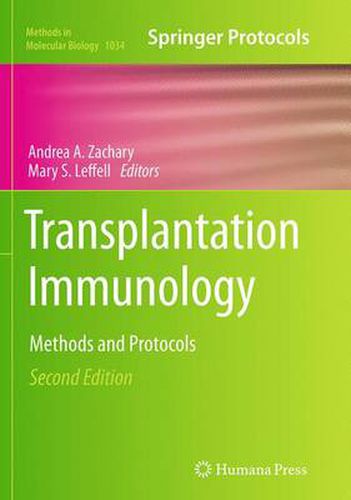Readings Newsletter
Become a Readings Member to make your shopping experience even easier.
Sign in or sign up for free!
You’re not far away from qualifying for FREE standard shipping within Australia
You’ve qualified for FREE standard shipping within Australia
The cart is loading…






This title is printed to order. This book may have been self-published. If so, we cannot guarantee the quality of the content. In the main most books will have gone through the editing process however some may not. We therefore suggest that you be aware of this before ordering this book. If in doubt check either the author or publisher’s details as we are unable to accept any returns unless they are faulty. Please contact us if you have any questions.
After decades of research in clinical transplantation, new techniques have been developed that permit a further understanding of the immune mechanisms underlying immune recognition of allografts and a more accurate and thorough evaluation of compatibility between donors and recipients. The second edition of Transplantation Immunology: Methods and Protocols expands upon the previous edition with current, detailed methods in transplantation immunology. The new methods chapters cover four major areas that are being applied in compatibility evaluations and ongoing transplantation immunology research. Seven overview chapters provide reviews of the molecular basis for alloreactivity, current understanding of humoral and cellular mechanisms, as well as new developments in thoracic organ transplantation, composite tissue transplantation and in the transplantation of sensitized patients. Written in the highly successful Methods in Molecular Biology ™ series format, chapters include introductions to their respective topics, lists of the necessary materials and reagents, step-by-step, readily reproducible laboratory protocols, and key tips on troubleshooting and avoiding known pitfalls.
Authoritative and practical, Transplantation Immunology: Methods and Protocol, Second Edition is devoted to transplantation immunology, both in the practice of compatibility testing and in transplantation research.
$9.00 standard shipping within Australia
FREE standard shipping within Australia for orders over $100.00
Express & International shipping calculated at checkout
This title is printed to order. This book may have been self-published. If so, we cannot guarantee the quality of the content. In the main most books will have gone through the editing process however some may not. We therefore suggest that you be aware of this before ordering this book. If in doubt check either the author or publisher’s details as we are unable to accept any returns unless they are faulty. Please contact us if you have any questions.
After decades of research in clinical transplantation, new techniques have been developed that permit a further understanding of the immune mechanisms underlying immune recognition of allografts and a more accurate and thorough evaluation of compatibility between donors and recipients. The second edition of Transplantation Immunology: Methods and Protocols expands upon the previous edition with current, detailed methods in transplantation immunology. The new methods chapters cover four major areas that are being applied in compatibility evaluations and ongoing transplantation immunology research. Seven overview chapters provide reviews of the molecular basis for alloreactivity, current understanding of humoral and cellular mechanisms, as well as new developments in thoracic organ transplantation, composite tissue transplantation and in the transplantation of sensitized patients. Written in the highly successful Methods in Molecular Biology ™ series format, chapters include introductions to their respective topics, lists of the necessary materials and reagents, step-by-step, readily reproducible laboratory protocols, and key tips on troubleshooting and avoiding known pitfalls.
Authoritative and practical, Transplantation Immunology: Methods and Protocol, Second Edition is devoted to transplantation immunology, both in the practice of compatibility testing and in transplantation research.